- Home
- Tom Stoppard
The Dog It Was That Died and Other Plays
The Dog It Was That Died and Other Plays Read online
The Dog It Was That Died
A Play for Radio
Characters
RUPERT PURVIS
GILES BLAIR
HOGBIN
SLACK
PAMELA BLAIR
MRS RYAN
COMMODORE ARLON
MATRON
DR SEDDON
VICAR
CHIEF
WREN
SCENE 1
Exterior. City. Night.
PURVIS’S footsteps on the pavement. An occasional vehicle passing, not very close.
PURVIS is coming up to retirement age. As he walks he is singing quietly, disjointedly, cheerfully . . . songs of farewell: the one beginning ‘Goodbye—ee . . . ’ . . . and ‘Goodbye, Piccadilly. . . ’ . . . and ‘We Don’t Want to Leave You but . . .’
This singing voice is the same time and place as the footsteps and the traffic. Over this is PURVIS’S own voice reading through a letter he has written. The singing voice and the footsteps, together with the occasional road and river traffic, continue intermittently underneath.
PURVIS: (Voice over) Dear Blair. I have decided I have had enough of this game and I’m getting out but before I take the plunge . . .
(PURVIS chuckles briefly but pulls himself together)
. . . before I take the plunge I thought I’d give you a tip which if you handle it right could put you in the top spot in the Department, assuming that that is what you want. I have no fastidious scruples myself about the Chief having an opium den in his house in Eaton Square—perhaps that is something more of us should be doing—but I dare say the Prime Minister would take a different view. That was the tip, by the way. I wish I had something more on him to give you but gone are the days when a man could be brought down by being named in the divorce courts, even for sexual misconduct with the wife of a subordinate, and I only mention it now because your good lady (is she called Pamela?—I only met her once) may have been pulling the wool over your eyes and you have always been more than decent to me. So you will have to do what you can with the opium den, and my only regret is that I won’t be here to enjoy the brouhaha . . .
(The here-and-now PURVIS adds a few ha-has to that one)
Actually, it’s not my only regret because I was looking forward to taking a belly dancer to Buckingham Palace—if the invitation was anything to do with you, many thanks for the thought. She’s a splendid girl, and would have made a bit of a splash. But now it’s left to me to do that. Thanks, anyway. There’s something of mine which has been in the family for ages and as I’m the last of the line you may like to have it. It’s supposed to have belonged to a one-legged sea captain who inspired the character of Long John Silver and I thought you might find a place for it in your folly. In all honesty, I saw one just like it on a piano in the trophy room at Cork Castle or somewhere, which gives one pause for thought, but I’ll send it round anyway.
(PURVIS is now walking across a bridge over the Thames (Chelsea Bridge) and Big Ben is heard distantly striking the quarter hour)
Well, I think that’s about all. I hope I won’t be bobbing up again so there shouldn’t be any problem about the remains. I have left enough in the kitty for a plaque on the wall of St Luke’s where I am church warden, and I would be grateful if you could make sure this is done. The vicar bears a grudge against me but if he starts making trouble you can take it from me that on the subject of that savoury business the choir is lying its head off man and boy, especially Hoskins, third from the end with the eyelashes. An inquiry would clear my name but I have no wish to see the diocese dragged through the mud. That is a fate I have reserved for—yours ever, Rupert Purvis.
(Now speaking ‘live’) Well, this seems to be about the middle . . . if I can manage the parapet . . . (He grunts and heaves himself up) . . . I’m too old for this game . . . nice breeze anyway . . . quiet as the grave and black as your hat— to hell with the lot of them, oh dear me . . . (He starts to sniffle, all cheerfulness gone) . . . never mind, it’s all over now. Off I . . . go . . .
(The last word is extended with PURVIS's plunge, which ends unexpectedly with the sound of a quite large dog in sudden and short-lived pain.)
SCENE 2
Exterior. City park (St James’s Park). Daytime.
Big Ben is striking ten.
BLAIR is middle-aged and a gentleman. HOGBIN is younger and perhaps less of a gentleman.
BLAIR: Good morning. On the dot.
HOGBIN: I see the tulips are in glorious bloom.
BLAIR:Absolutely. What can I do for you, Hogbin?
HOGBIN: I’m sorry—do we know each other?
BLAIR:I prefer thingummies myself. What’s all this about?
HOGBIN:I see the tulips are in glorious bloom.
BLAIR::So you said. I prefer hollyhocks myself. (Pause) Hibiscus? (Pause) Come on, Hogbin. I’m Blair. We’ve met. A couple of years ago up in Blackheath, don’t you remember?
HOGBIN: I’m afraid not.
BLAIR:Two days and nights in the back of a laundry van watching a dead-letter drop for a pigeon who never turned up . . . I’ll never forget Blackheath.
HOGBIN: (Carefully) I was in Blackheath once.
BLAIR: Of course you were. That was you in the white apron, brought me chicken in a basket. I mean a laundry basket. So stop fooling about. (Pause) Gladioli? (Pause) All right, I’ll just sit on this bench and enjoy the view. The view north from St James’s Park is utterly astonishing, I always think. Domes and cupolas, strange pinnacles and spires. A distant prospect of St Petersburg, one imagines . . . Where does it all go when one is in the middle of it, standing in Trafalgar Square with Englishness on every side? Monumental Albion, giving credit where credit is due to some sketchbook of a Grand Tour, but all as English as a 49 bus.
HOGBIN: With or without chips?
BLAIR: As I remember it was a baked potato in silver foil, and a KitKat.
HOGBIN:Hydrangeas.
BLAIR:That was it. I prefer Hydrangeas myself.
HOGBIN: I’m sorry, sir, but . . .
BLAIR: Perfectly all right. Keen gardener, are you?
HOGBIN: Do you run a man called Purvis, Mr Blair?
BLAIR: Rupert Purvis?
HOGBIN: Yes. He tried to kill himself last night. He killed a dog instead.
BLAIR:I see.
HOGBIN:Sir?
BLAIR: I said—I see.
HOGBIN: Oh. Well. Well, he jumped off Chelsea Bridge at 3.16 this morning, precisely at high tide. A precise man, Mr Purvis.
BLAIR:Yes.
HOGBIN: Unfortunately he landed on a barge.
BLAIR: You mean fortunately.
HOGBIN: I was looking at it from his point of view.
BLAIR: Of course.
HOGBIN: In fact he landed on a barge dog. The dog broke Purvis’s fall. Purvis broke the dog’s back. The barge dropped Purvis off downstream at St Thomas’s.
BLAIR: And that’s where he is now?
HOGBIN: Yes, sir.
BLAIR: Well, I’ll pop down and see him. Thank you, Hogbin.
HOGBIN: There is something else, sir.
BLAIR: Yes. What kind of dog was it?
HOGBIN: I don’t know, sir.
BLAIR: Well, it wouldn’t be anything special. Fifty pounds, more than ample, wouldn’t you say?
HOGBIN: I hadn’t really thought, sir.
BLAIR: I would say fifty. If your Chief won’t wear it, I dare say mine will.
HOGBIN: I didn’t want to mention this to your Chief.
BLAIR: Oh, he’s all right for fifty, don’t worry. You worry too much, Hogbin, if I may say so. I’m grateful to you for taking th
is trouble but it would have been quite all right for you to come to the office.
HOGBIN: No, sir. I thought it was better to talk outside. It’s not about the dog, sir. It’s about a letter. Purvis posted a letter a few minutes before he jumped. We retrieved it.
BLAIR: You’ve been following him, Hogbin.
HOGBIN: We didn’t know he was one of our own.
BLAIR:He wasn’t yours, he was mine. Still is.
HOGBIN: That’s what I meant.
BLAIR: Well, who did you think he was?
HOGBIN: We thought he was one of theirs.
BLAIR: I see.
HOGBIN: He was followed from Highgate Hill to a house in Church Street, Chelsea.
BLAIR: He lives there.
HOGBIN: Yes, so I gather. He left the house again just before three, leaving all the lights on. He knew he wouldn’t have to pay any more bills. He walked to the river.
BLAIR: Posting a letter on the way. Whereabouts in Highgate did you follow him from? Highgate Hill Square?
HOGBIN: You obviously know all about it.
BLAIR: Everybody knows their safe house. Red Square we call it.
HOGBIN: We call it Dunkremlin.
BLAIR: Why?
HOGBIN:Sir?
BLAIR: Why did you follow him? Was he acting suspiciously?
HOGBIN: Not exactly suspiciously. He walked out of the front door, slamming it behind him.
BLAIR: Well, I give him a pretty free rein. When did you realize he was Q6?
HOGBIN: It was the letter. Here you are, sir. You understand, sir, that we had to open all the letters in the box in order to ascertain .
BLAIR: Yes, of course. Thank you. I’ll read it later. Anything else?
HOGBIN:Sir?
BLAIR: I said—anything else?
HOGBIN: Well, the letter’s a bit . . . Would you say that Mr Purvis had been overworking lately?
BLAIR: Well, I haven’t been overworking him. But of course I can’t speak for them.
SCENE 3
Interior. Hospital.
BLAIR: Well, Purvis, this is all very silly. What on earth did you think you were doing jumping off bridges?
PURVIS:Oh, hello, sir. How good of you to come.
BLAIR: Not at all. Are you quite comfortable?
PURVIS:Yes, thank you. I’m grateful for the private room.
BLAIR:I meant with your feet winched up like that. You put me in mind of a saucy postcard.
PURVIS: I put the nurses in mind of midwifery. But I appreciate your not mincing words. You’re the first person who has mentioned the word jump or bridge since I got here. I thought I must have imagined it all. By the way, was there something about a dog?
BLAIR:Yes. You’re the first person to jump off a bridge on to a dog. The reverse one often used to see at the Saturday morning cinema, of course.
PURVIS: Men jumping off dogs onto . . . ?
BLAIR:No, dogs jumping off bridges on to . . .
PURVIS: Oh yes. What a relief anyway. I was beginning to think I’d gone cuckoo.
BLAIR:Your relief may be premature. There’s nothing cuckoo about imagining things. Cuckoo is jumping off bridges. Are you in any sort of trouble?
PURVIS:Well, one had a bit of a crise, you know.
BLAIR:Yes. Do you remember writing me a letter?
PURVIS:Have you received it already?
BLAIR:Special delivery.
PURVIS:I wasn’t going to mention it.
BLAIR:I shouldn’t have done so.
PURVIS: A bit of a shaker, I expect.
BLAIR:Well, these things happen in all families.
PURVIS: You mean that business about your wife. I’m sorry. It’s the last thing one would have expected of a woman who runs a donkey sanctuary—concubine to an opium addict.
BLAIR: (Huffily) Now look here, Purvis—
PURVIS: Yes, I’m so sorry—one loses all one’s social graces when one expected to be dead.
BLAIR: I didn’t mean my family. I meant Q6. People having what you call a bit of a crise. I suggest we draw the veil, eh? Least said, soonest mended.
PURVIS: You must do as you think fit. Personally I think you’d make an excellent number one, but I can quite see that you might take the view that it’s nobody’s business what the Chief gets up to in his own time so long as he doesn’t bring his pipe to the office. Perhaps you think I’m a bit of a cad for sneaking?
BLAIR:These decisions are never easy. By the way, where did this story come from?
PURVIS: It’s all over Highgate.
BLAIR:I see.
PURVIS:I was up there last night actually.
BLAIR:Really?
PURVIS: I went to visit my friend.
BLAIR:Oh yes?
PURVIS:He was none too pleased.
BLAIR:No?
PURVIS:I was after some information.
BLAIR:And did you get it?
PURVIS: No. I said to him, look, I said, can you just remind me— what is the essential thing we’re supposed to be in it for?—the ideological nub of the matter? Is it power to the workers; is it the means of production, distribution and exchange; is it each according to his needs; is it the expropriation of the expropriators? Know what he said? Historical inevitability! Historical inevitability! You’re joking, I said. Pull the other one, it’s got bells on. No, you’ll have to do better than that. Something can’t be good just because it’s inevitable. It may be good and it may be inevitable, but that’s no reason, it may be rotten and inevitable. He couldn’t see it. So I left. None the wiser. Perhaps you could help me on this one, Blair.
BLAIR: Oh . . . I don’t know . . . they did give us a run-down on it years ago . . . one of those know-thy-enemy lectures . . . I didn’t take much notice. There was something called the value of labour capital which seemed to be important but I never understood what it was.
PURVIS: No, I mean from your side of the fence.
BLAIR:Mine?
PURVIS: Yes. It’s important to me. Can you remind me, what was the gist of it?—the moral and intellectual foundation of Western society in a nutshell.
BLAIR: I’m sorry, my mind’s gone blank.
PURVIS: Come on—democracy . . . free elections, free expression, free market forces . . .
BLAIR:Oh yes, that was it.
PURVIS: Yes, but how did we deal with the argument that all this freedom merely benefits the people who already have the edge? I mean, freedom of expression advantages the articulate . . . Do you see?
BLAIR: You’re going a bit fast for me, Purvis. I never really got beyond us being British and them being atheists and Conunumsts. There’s no arguing with that, is there? Are you quite sure you aren’t in any sort of trouble?
PURVIS:Depends what you mean by trouble.
BLAIR:Your letter mentioned some unsavoury business with choirboys.
PURVIS:Savoury business, not unsavoury business.
BLAIR:Savoury business?
PURVIS:Yes. You know what a savoury is. Mushrooms on toast . . . sardines . . . or, in this case, Welsh rarebit.
BLAIR:I see. Well, you just have a jolly good rest, Rupert, take the weight off your feet .
PURVIS:As you see.
BLAIR:Yes, of course. But we’ll soon have you back on them. You were lucky.
PURVIS:Luckier than the dog.
BLAIR:Yes. It was the dog that died.
SCENE 4
Exterior. Garden.
BLAIR:I admit it looks odd. The question is does it look odd enough?

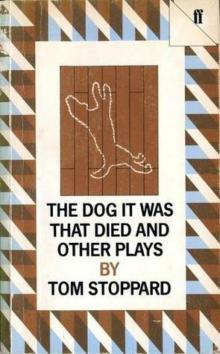 The Dog It Was That Died and Other Plays
The Dog It Was That Died and Other Plays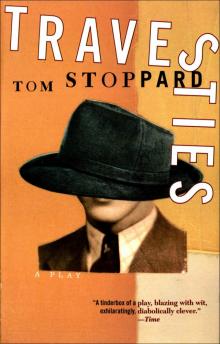 Travesties
Travesties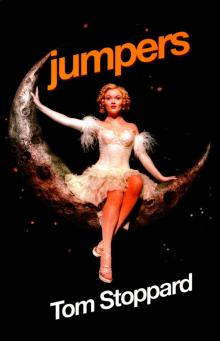 Jumpers
Jumpers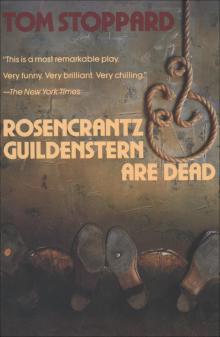 Rosencrantz and Guildenstern Are Dead
Rosencrantz and Guildenstern Are Dead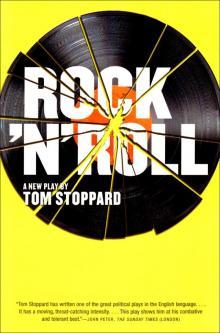 Rock 'N' Roll
Rock 'N' Roll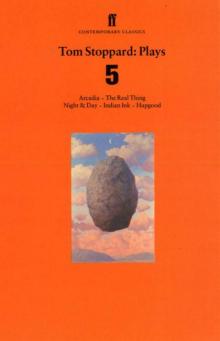 Plays 5
Plays 5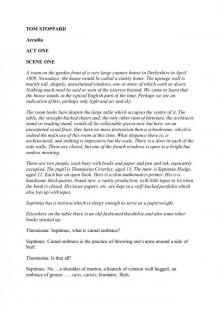 Arcadia
Arcadia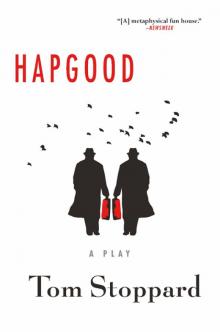 Hapgood
Hapgood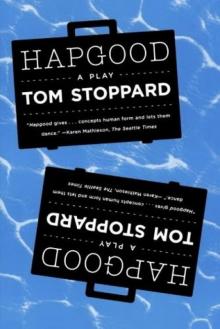 Hapgood: A Play
Hapgood: A Play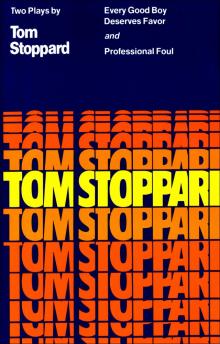 Every Good Boy Deserves Favor & Professional Foul
Every Good Boy Deserves Favor & Professional Foul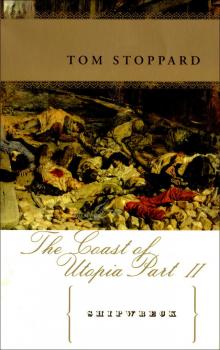 The Coast of Utopia: Voyage, Shipwreck, Salvage
The Coast of Utopia: Voyage, Shipwreck, Salvage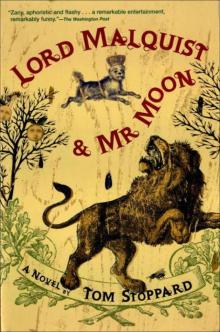 Lord Malquist & Mr. Moon
Lord Malquist & Mr. Moon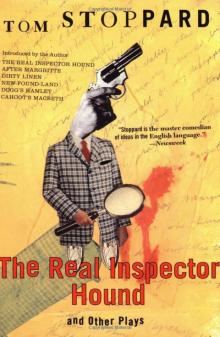 The Real Inspector Hound and Other Plays
The Real Inspector Hound and Other Plays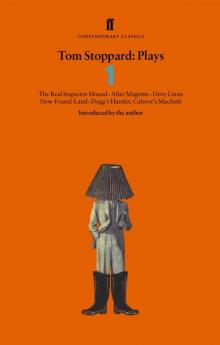 Tom Stoppard Plays 1
Tom Stoppard Plays 1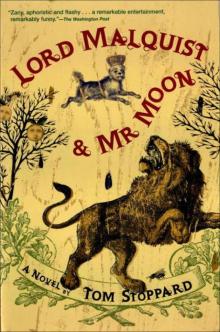 Lord Malquist & Mr. Moon: A Novel
Lord Malquist & Mr. Moon: A Novel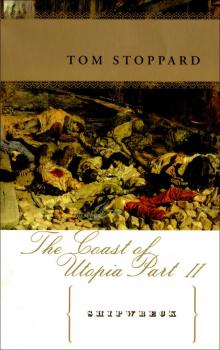 Shipwreck
Shipwreck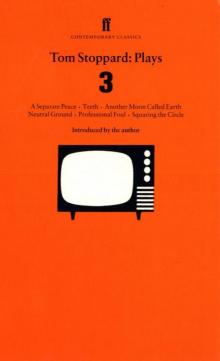 Tom Stoppard Plays 3
Tom Stoppard Plays 3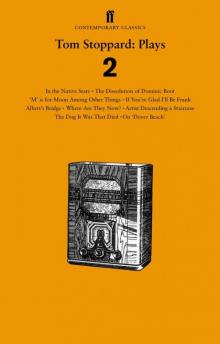 Tom Stoppard Plays 2
Tom Stoppard Plays 2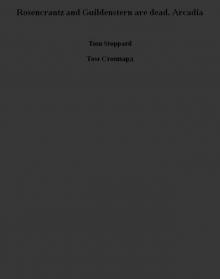 Rosencrantz and Guildenstern are dead. Arcadia
Rosencrantz and Guildenstern are dead. Arcadia